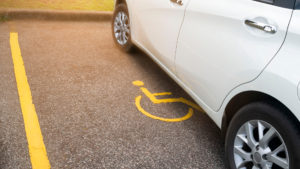Under the totting up system, if a driver receives 12 penalty points or more in any three year period, they will be sent to court and faced with the possibility of an automatic driving disqualification.
In court, defendants have the opportunity to make a plea against a driving ban under the defence that it would impose ‘exceptional hardship’ if enforced. This is done via the submission of an exceptional hardship, which is designed to persuade the courts that a driving ban would be particularly harsh punishment, considering the circumstances.
What is a Driving Disqualification Exceptional Hardship?
An exceptional hardship is what can be submitted by you, the defendant, as part of your plea in court to retain your driving licence after totting up 12 or more points under the totting up system. This plea will typically contain any information you can provide on how a driving ban could impact your life beyond a level that would normally be expected.
It is an obligation for the court to consider all the defendant’s circumstances during a hearing – including the nature of the driving offence and the effect a driving ban could have on your life. The court must assess the severity of the implications and decide, under their discretion, whether or not a ban would amount to ‘hardship which is beyond that normally suffered’.
If your submission of exceptional hardship is successful, it means that the court deems your circumstances ‘exceptional’ and sufficient to justify not imposing a driving ban.
Looking for Convicted Driver Car Insurance?
If you’re looking for insurance after a driving conviction, Keith Michaels can help.
We have 35+ years’ experience arranging cover for drivers with convictions. Find out more information today.
Who Qualifies for a Totting Up Ban and Exceptional Hardship Case?
Section 28 of the Road Traffic Act 1991
Under the provisions of Section 28 of the Road Traffic Act 1991 (and also in the 1988 Road Traffic Offenders Act), any driver with a full driving licence that accumulates 12 or more penalty points in any three-year period must attend a court hearing and face a totting up ban lasting a minimum of six months.
A totting up court hearing is immediately triggered when a driver with 9 points on his licence receives a fixed penalty of 3 points for a driving offence. He or she is then summoned to court to argue against a driving ban and give valid reasons why they should not lose their licence. In certain circumstances the court has a discretion not to impose a ban, or increase the disqualification period it if they think it is necessary.
Road Traffic (New Drivers) Act 1995
If however the defendant is within the first two years of passing their first driving test and accumulates 6 or more points, they will automatically have their driving licence taken away. This is defined by the Road Traffic (New Drivers) Act 1995.
At the end of their ban, they will have to retake a theory and practical driving test in order to obtain another full driving licence.
What Arguments Can Be Used In An Exceptional Hardship Case?
For an exceptional hardship case to be successful in a totting up hearing, several elements need to be considered. The following are examples of what a court might consider to be ‘exceptional hardship’:

Loss of career
If the defendant can source relevant supporting information (that is presented well) on how their career will be affected by a driving ban, they could persuade magistrates to exercise a discretion. However, this argument alone is not enough to avoid a ban.

A career that is important to the health or safety of others
If a defendant can argue their career has a high level of importance in ensuring the health and safety of the public or specific group of people, they could possibly avoid a driving ban.

Financial hardship
One of the most common arguments is that a driving ban, and potential loss of employment, could result in financial difficulties.

A threat to the job stability of employees
If the defendant is a manager, key employee or business owner, the courts may consider a driving ban to be too harsh due to such work related effects.

A restriction on mobility
If a defendant has severe health problems in which a driving ban could severely restrict mobility, the courts may choose to exercise a discretion.

A restriction on transport
If there is an inability for the defendant to get to any work due to geographical and public transport restrictions.
Using Exceptional Hardship Arguments in Court
If you have had a court hearing before where you successfully argued a set of reasons for exceptional hardship, you will only be able to use these reasons a second time if it has been more than three years since the previous court hearing. Otherwise, you will need to submit completely new reasons for your hardship plea.
Legal Advice and/or Representation
Although it is possible to represent yourself in court, you should strongly consider seeking advice from a legal professional to ensure your exceptional hardship fully meets the requirements imposed by the court.
The legal system can be complicated, particularly when it comes to exceptional hardships. If you aren’t knowledgeable of the process you may be unaware of the issues that should be addressed to persuade the court not to impose a ban. An exceptional hardship is the only opportunity you have to keep your licence, and if you do not feel confident addressing the court by yourself, enlisting the help of a trained professional is the best option.
How to Submit a Driving Disqualification Exceptional Hardship
If you are taken to court, you will probably attend a hearing at a Magistrates Court (in England and Wales) or at the Sheriff’s Court or Justice of the Peace Court in Scotland. You will be expected to attend in person, fully prepared with a detailed exceptional hardship submission. This should contain all the possible implications of a driving disqualification.
If you are not fully prepared, there is a strong chance your case will be dismissed quickly and a ban imposed. Seeking help from a legal professional is a good idea if you want to make sure your exceptional hardship plea is properly planned for presenting in court.
Totting Up Ban Insurance
If you’ve had a driving disqualification imposed under the totting up system, it can be minefield searching for competitive car insurance. Here at Keith Michaels we are specialists in providing insurance cover for convicted drivers and are happy to arrange totting up ban Insurance for you.


